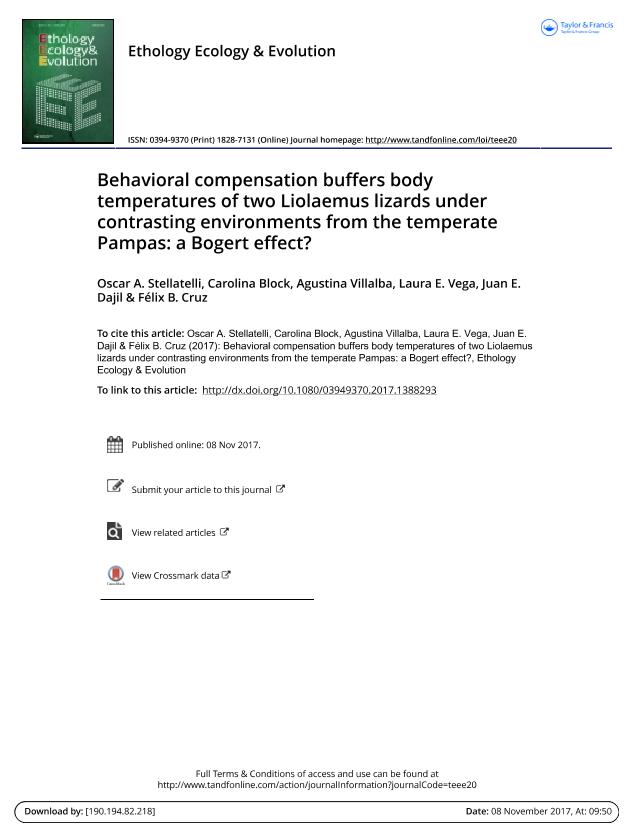Artículo
Behavioral compensation buffers body temperatures of two Liolaemus lizards under contrasting environments from the temperate Pampas: a Bogert effect?
Stellatelli, Oscar Aníbal ; Block, Carolina
; Block, Carolina ; Villalba, Agustina
; Villalba, Agustina ; Vega, Laura Estela; Dajil, Juan Esteban; Cruz, Felix Benjamin
; Vega, Laura Estela; Dajil, Juan Esteban; Cruz, Felix Benjamin
 ; Block, Carolina
; Block, Carolina ; Villalba, Agustina
; Villalba, Agustina ; Vega, Laura Estela; Dajil, Juan Esteban; Cruz, Felix Benjamin
; Vega, Laura Estela; Dajil, Juan Esteban; Cruz, Felix Benjamin
Fecha de publicación:
07/2018
Editorial:
Universita Degli Studi Di Firenze
Revista:
Ethology Ecology & Evolution
ISSN:
0394-9370
Idioma:
Inglés
Tipo de recurso:
Artículo publicado
Clasificación temática:
Resumen
Postural adjustments and microhabitat selection are two behavioral mechanisms that lizards extensively use to regulate their body temperatures. The Bogert effect occurs when behavioral thermoregulation buffers potential changes in body temperatures of congeneric organisms due to environmental variation, in turn precluding physiological evolution. We compared field body temperatures (Tb) and behavioral thermoregulation traits between two Liolaemus lizards: the saxicolous Liolaemus tandiliensis and the arenicolous Liolaemus wiegmannii. These species are spatially segregated in two thermally contrasting environments from the SE of the temperate Pampas of Argentina. During summer, the mean operative temperature (Te) of the coastal sand dunes occupied by L. wiegmannii was 9 ºC higher than that of the Tandilia mountains inhabited by L. tandiliensis. Despite the contrasting thermal conditions of both habitats, the mean Tb of L. tandiliensis (34.72 °C) was similar to that of L. wiegmannii (35.01 °C). The behavioral thermoregulation mechanisms varied considerably between both species. Liolaemus tandiliensis combined static body posture with displacements towards sunlit areas. In contrast, L. wiegmannii combined elevated and prostrated body postures with movements towards full and filtered sun patches. Environmental gradients offer diverse challenges impelling lizards to find different behavioral thermoregulation adaptations in order to partially cope with environmental constraints. This occurs in many species of Liolaemus that are thermoregulatory efficient despite of the climatic adversities. In this study, two species of Liolaemus used different postural and microhabitat path-selection strategies according to climate, allowing them to buffer changes in Tb, thus suggesting that the Bogert effect may be occurring in these two species.
Palabras clave:
Behavior
,
Liolaemus
,
Reptiles
,
Temperate Climate
,
Thermoregulation
Archivos asociados
Licencia
Identificadores
Colecciones
Articulos(CCT - MAR DEL PLATA)
Articulos de CTRO.CIENTIFICO TECNOL.CONICET - MAR DEL PLATA
Articulos de CTRO.CIENTIFICO TECNOL.CONICET - MAR DEL PLATA
Articulos(IIMYC)
Articulos de INSTITUTO DE INVESTIGACIONES MARINAS Y COSTERAS
Articulos de INSTITUTO DE INVESTIGACIONES MARINAS Y COSTERAS
Citación
Stellatelli, Oscar Aníbal; Block, Carolina; Villalba, Agustina; Vega, Laura Estela; Dajil, Juan Esteban; et al.; Behavioral compensation buffers body temperatures of two Liolaemus lizards under contrasting environments from the temperate Pampas: a Bogert effect?; Universita Degli Studi Di Firenze; Ethology Ecology & Evolution; 30; 4; 7-2018; 297-318
Compartir
Altmétricas



